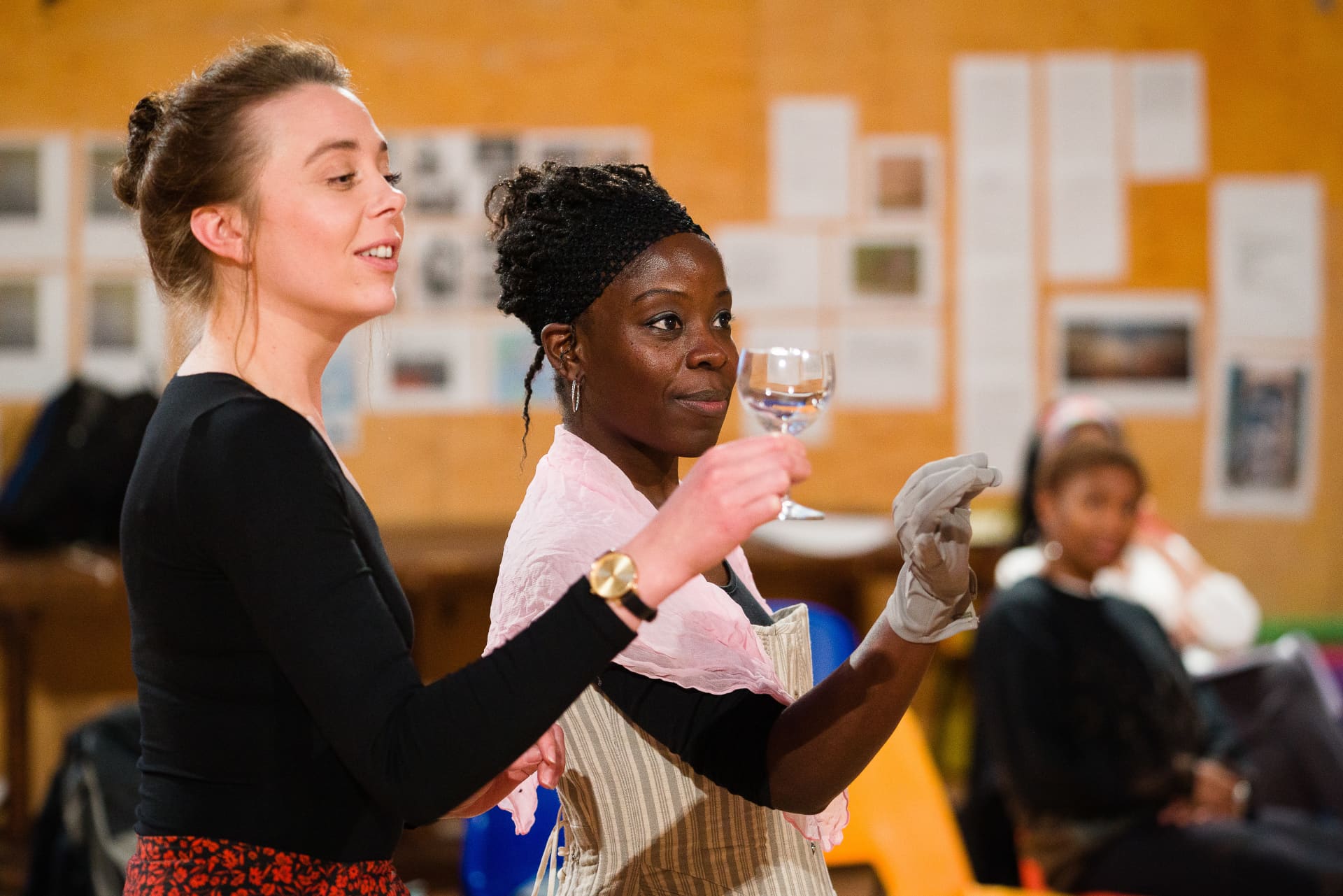It’s 19th-century London, and politicians move to abolish the slave trade. But the price is a multi-billion pound bailout to compensate every slave owner, compromising social justice nearer home. Juliet Gilkes Romero’s new play, The Whip, asks: what is the right thing to do, and how much must it cost? Here Sam Bennett talks to its director, Kimberley Sykes, about failure, complex conversations, and the seeds of suffrage.
It must be an odd time for you as a director; you’re rehearsing The Whip (which we’ll come onto in a moment) but also your RSC production of As You Like It is off on tour, following runs in Stratford-upon-Avon and the Barbican.
It’s when compartmentalisation comes into full force. As a director, you have to be 100 percent present in whichever room you’re in; whichever play you’re working on, creative you’re working with. You have to switch everything else off. Then the same day, you’ve got to be 100 percent present in another room doing a completely different play set in a whole other time period. It’s exhausting… thrilling, but yeah, you get home at night-time and need a bit of time for yourself as well.
I suppose a show is out of the director’s hands from opening night to an extent, but is that heightened when it then tours the country, and you’re not there for every show?
I guess that’s where it’s a real test of whether I’ve directed it to be able to thrive in different venues and with different audiences. I always knew with As You Like It – because it was such a long run and it was going to start in Stratford-upon-Avon, then go to London, then travel around the country – that I needed to give some freedom to the actors and the production; allow it to adapt to whoever it’s speaking to. Certain plays need to be really tightly choreographed and then there are other plays, like As You Like It, where there are moments of absolute specificity but there are scenes where I’ve allowed for more improvisation and for the actors to be freer, so it never feels stale and they can really respond to the audience. One of the most important things for audiences is that they feel like their presence in that room matters and might change whatever happens on stage. Otherwise, stay at home and watch telly. You can really feel it in the theatre when it’s a relationship between the audience and the actors rather than a lecture.
How do you assess an actor’s ability to do that at audition stage?
It’s really hard. I think it was Artaud that said – and I’ve probably just made up my own version of this quote – something like: ‘the actor needs to have the intellect of the philosopher, the body of an athlete and the imagination of a child.’ There’s something in that. I think actors are extraordinary human beings. I’m not and couldn’t be one, but I’m really interested in touching upon all three of those things in an audition. A massive part of the audition for me is getting to know them as artists rather than puppets that get moved around the stage and told what to do. That’s not the way I work. So, I spend quite a lot of time in conversation with them – also because we’ve got to work together for a long time; it’s important we can talk with each other and get excited about ideas together. The physicality thing is about filling space, I’m interested in whether actors can live in their skin, express themselves physically and through their breath, and tell a story by fully embodying a character. The imagination bit comes with saying to actors: ‘I don’t have an idea in my head of exactly how I think it needs to go. I’m actually really interested in us two finding out what that might be together.’ Sometimes, as soon as you give an actor permission, you relieve them of that sense that the director has a secret they’re not sharing. It frees them to be able to play and fail as well. So much of a rehearsal is failing and it’s important that I’m working with actors who are ok with that, because it’s only when you fail that ultimately you get it right.
I spoke to one of the actors from The Inheritance who said if Stephen Daldry didn’t know how they were going to deliver a scene, he would say so.
They’re the three most important words a director can say to a company: I don’t know. You can’t pretend not to know because that’s just dishonest, but a director needs to be allowed to not know what’s going to happen next and be surprised by the room and get a bit stuck. Directors don’t have a magic wand and they don’t know the meaning of life. Sometimes when it appears to be too magic, it’s not real and other people can’t access it. Whereas to be messy in the room – to fall over, make a dick of yourself, be human, get it wrong and find it difficult – is just honest. And honesty and transparency are two of the most important things.
You’re directing The Whip which is somewhat more harrowing than As You Like It.
It is. This is where being completely present in the room is so important. The Whip is dealing with massive trauma from many different places and from lots of characters. Sometimes that trauma is physical and visible on someone’s body (a runaway slave or a millworker who’s tried to rescue her child from inside a spinning mule) but it’s also dealing with the emotional trauma of that. There’s a character at the centre of it called Lord Alexander Boyd, the chief whip (it’s set in 1833 in parliament) trying to push through the Abolition Bill because he believes the transatlantic slave trade is a terrible thing and needs to be eradicated. However, he comes upon many stumbling blocks and has to make compromises because of the way politics works. Somebody from the outside might criticise him for the compromises he makes, but when you’re inside of it and fighting for something so radical, I think that is very traumatic for somebody as well. Yet I say that and go, ‘what am I saying? How on earth does this privileged white man’s trauma compare to other characters in the play who’ve experienced slavery in its truth?’ That’s the debate the play’s having, the debate Juliet wants to have. There’s no such thing as a goodie or a baddie, it’s not black and white, it’s very grey. The transatlantic slave trade has often been portrayed in very simplistic terms to make it easier for people to digest, and this play is having the difficult, complex, messy, sometimes funny, sometimes incredibly sad conversation that gets people talking about it. Very few people know that there was a massive bailout where our government had to take out a loan to compensate the slave owners for their ‘loss of property’ in order to abolish slavery. It equates to something like £20 billion in today’s money. And the MPs were the people receiving this money, when they all celebrated the abolition, they were celebrating because they were about to go and check their bank balances – and companies that still exist today got rich from the abolition. The slaves didn’t receive a single penny and in fact were then subjected to seven years of forced apprenticeship – slavery by another name – because the western world didn’t trust that black people could be civilised members of society. People think that when this country abolished slavery it was this wonderful humanitarian effort. It was not. It was barely humanitarian, barely moral, it was financial – and some of the politicians in power today, are in that position because they’re descended from slave owners.
How significant is it that The Whip runs during Women’s History Month?
We keep having these gorgeous coincidences that we call blessings from the ancestors. On our first day of rehearsals it was the International Day for the Abolition of Slavery – that was completely by accident. And with Women’s History Month, it’s purely a coincidence, but these lovely happenings plant an awareness in people’s minds. If they’re seeing it on other platforms, they might come to this play with an awareness of women’s roles. The play is pre-suffragette movement, but Juliet has identified through her research that the reason for so many women’s groups gathering was in order to abolish slavery. There were working-class and middle-class women all around the regions coming together to sign petitions and have debates in their towns about the abolition. Nowadays we have online petitions and if they reach a certain point they have to be discussed in parliament; petitioning was barely even recognised in 1833, but it was women’s groups fighting for the abolition of slavery who put it on the map. They inundate MPs’ desks with them, they played a huge role in abolition. After it was achieved these women came together and said, ‘ok, this has been good, getting together and talking, so what next? What about suffrage? What about we ask for the vote?’ So, there is a direct link between the abolition of slavery and early women’s suffrage, that we look at in the play.
And I wish you all the best with it, I’m really looking forward to press night.
Do come and say hello – I’ll be wearing a red dress.
For any specific reason?
No, it’s just that I spent quite a lot of money on it and I’ve only worn it once.









